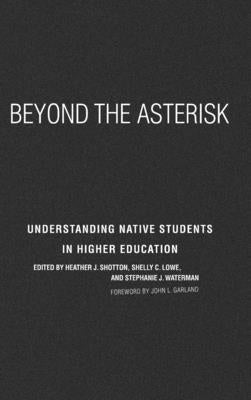Before you leave...
Take 20% off your first order
20% off
Enter the code below at checkout to get 20% off your first order
Discover summer reading lists for all ages & interests!
Find Your Next Read

A Choice Outstanding Academic Title for 2013While the success of higher education and student affairs is predicated on understanding the students we serve, the reality is, where the Native American population is concerned, that this knowledge is generally lacking. This lack may be attributed to this population's invisibility within the academy - it is often excluded from institutional data and reporting, and frequently noted as not statistically significant - and its relegation to what is referred to as the "American Indian research asterisk."The purpose of this book is to move beyond the asterisk in an effort to better understand Native students, challenge the status quo, and provide an informed base for leaders in student and academic affairs, and administrators concerned with the success of students on their campuses.The authors of this book share their understanding of Native epistemologies, culture, and social structures, offering student affairs professionals and institutions a richer array of options, resources, and culturally-relevant and inclusive models to better serve this population. The book begins by providing insights into Native student experiences, presenting the first-year experience from a Native perspective, illustrating the role of a Native living/learning community in student retention, and discussing the importance of incorporating culture into student programming for Native students as well as the role of Native fraternities and sororities.The authors then consider administrative issues, such as the importance of outreach to tribal nations, the role of Tribal Colleges and Universities and opportunities for collaborations, and the development of Native American Student Services Units..The book concludes with recommendations for how institutions can better serve Native students in graduate programs, the role that Indigenous faculty play in student success, and how professional associations can assist student affairs professionals with fulfilling their role of supporting the success of Native American students, staff, and faculty. This book moves beyond the asterisk to provide important insights from Native American higher education leaders and non-Native practitioners who have made Native students a priority in their work.While predominantly addressed to the student affairs profession - providing an understanding of the needs of the Native students it serves, describing the multi-faceted and unique issues, characteristics and experiences of this population, and sharing proven approaches to developing appropriate services - it also covers issues of broader administrative concern, such as collaboration with tribal colleges; as well academic issues, such as graduate and professional education. The book covers new material, as well as expanding on topics previously addressed in the literature, including Native American Greek organizations, incorporating Native culture into student programming, and the role of Native American Special Advisors. The contributors are themselves products of colleges and universities where Native students are too often invisible, and who succeeded despite the odds. Their insights and the examples they provide add richness to this book. It will provide a catalyst for new higher education practices that lead to direct, and increased support for, Native Americans and others who are working to remove the Native American asterisk from research and practice.
Heather J. Shotton is a member of the Wichita & Affiliated Tribes, and is also of Kiowa and Cheyenne descent. She currently serves as an Assistant Professor in Native American Studies at the University of Oklahoma. Her research focuses on Native American student success, Indigenous higher education, and Indigenous women in the academy.
Shelly C. Lowe is Navajo from Ganado, Arizona. She is the Executive Director of the Harvard University Native American Program (HUNAP). Prior to being at Harvard she worked in Native American student affairs at Yale University and in American Indian Studies at The University of Arizona, where she is completing her Ph.D. in Higher Education.
Stephanie J. Waterman is Onondaga, Turtle Clan. She is an Associate Professor, in Leadership, Higher & Adult Education, at the Ontario Institute for Studies in Education, and coordinates the Student Development/Student Services in Postsecondary Education at the University of Toronto. Prior to her appointment at OISE, she was a faculty member in Higher Education administration in Educational Leadership at the Warner Graduate School of Education and Human Development, University of Rochester, and Faculty Associate for the Syracuse University Native Student Program, she researches Native student experiences, faculty/staff/student interaction, and First Nations/Native American Student Affairs units.
John Garland is Assistant Professor, Rehabilitation Counseling Program, University of Alabama.
Thanks for subscribing!
This email has been registered!
Take 20% off your first order
Enter the code below at checkout to get 20% off your first order